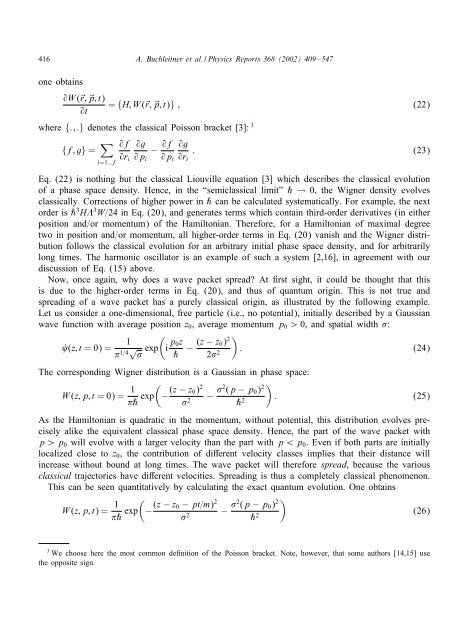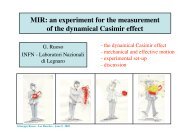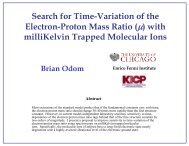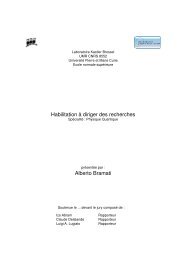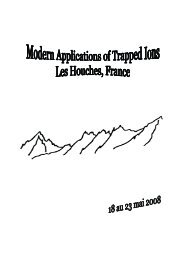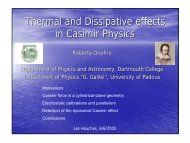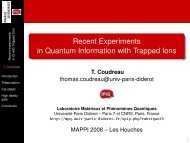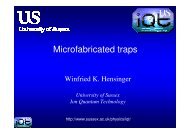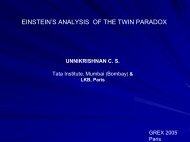Non-dispersive wave packets in periodically driven quantum systems
Non-dispersive wave packets in periodically driven quantum systems
Non-dispersive wave packets in periodically driven quantum systems
Create successful ePaper yourself
Turn your PDF publications into a flip-book with our unique Google optimized e-Paper software.
416 A. Buchleitner et al. / Physics Reports 368 (2002) 409–547<br />
one obta<strong>in</strong>s<br />
9W (˜r; ˜p; t)<br />
= {H; W (˜r; ˜p; t)} ; (22)<br />
9t<br />
where {:;:} denotes the classical Poisson bracket [3]: 3<br />
{f; g} = <br />
i=1:::f<br />
9f<br />
9ri<br />
9g<br />
9pi<br />
− 9f<br />
9pi<br />
9g<br />
9ri<br />
: (23)<br />
Eq. (22) is noth<strong>in</strong>g but the classical Liouville equation [3] which describes the classical evolution<br />
of a phase space density. Hence, <strong>in</strong> the “semiclassical limit” ˝ → 0, the Wigner density evolves<br />
classically. Corrections of higher power <strong>in</strong> ˝ can be calculated systematically. For example, the next<br />
order is ˝3H 3W=24 <strong>in</strong> Eq. (20), and generates terms which conta<strong>in</strong> third-order derivatives (<strong>in</strong> either<br />
position and=or momentum) of the Hamiltonian. Therefore, for a Hamiltonian of maximal degree<br />
two <strong>in</strong> position and=or momentum, all higher-order terms <strong>in</strong> Eq. (20) vanish and the Wigner distribution<br />
follows the classical evolution for an arbitrary <strong>in</strong>itial phase space density, and for arbitrarily<br />
long times. The harmonic oscillator is an example of such a system [2,16], <strong>in</strong> agreement with our<br />
discussion of Eq. (15) above.<br />
Now, once aga<strong>in</strong>, why does a <strong>wave</strong> packet spread? At rst sight, it could be thought that this<br />
is due to the higher-order terms <strong>in</strong> Eq. (20), and thus of <strong>quantum</strong> orig<strong>in</strong>. This is not true and<br />
spread<strong>in</strong>g of a <strong>wave</strong> packet has a purely classical orig<strong>in</strong>, as illustrated by the follow<strong>in</strong>g example.<br />
Let us consider a one-dimensional, free particle (i.e., no potential), <strong>in</strong>itially described by a Gaussian<br />
<strong>wave</strong> function with average position z0, average momentum p0 ¿ 0, and spatial width :<br />
<br />
1<br />
(z; t =0)= √ exp i<br />
1=4 p0z<br />
2 (z − z0)<br />
−<br />
˝ 2 2<br />
<br />
: (24)<br />
The correspond<strong>in</strong>g Wigner distribution is a Gaussian <strong>in</strong> phase space:<br />
W (z; p; t =0)= 1<br />
˝ exp<br />
<br />
2 2 (z − z0) (p − p0)<br />
− − 2<br />
2<br />
˝2 <br />
: (25)<br />
As the Hamiltonian is quadratic <strong>in</strong> the momentum, without potential, this distribution evolves precisely<br />
alike the equivalent classical phase space density. Hence, the part of the <strong>wave</strong> packet with<br />
p¿p0 will evolve with a larger velocity than the part with p¡p0. Even if both parts are <strong>in</strong>itially<br />
localized close to z0, the contribution of di erent velocity classes implies that their distance will<br />
<strong>in</strong>crease without bound at long times. The <strong>wave</strong> packet will therefore spread, because the various<br />
classical trajectories have di erent velocities. Spread<strong>in</strong>g is thus a completely classical phenomenon.<br />
This can be seen quantitatively by calculat<strong>in</strong>g the exact <strong>quantum</strong> evolution. One obta<strong>in</strong>s<br />
W (z; p; t)= 1<br />
˝ exp<br />
<br />
− (z − z0 − pt=m) 2<br />
2<br />
−<br />
2 (p − p0) 2 <br />
3<br />
We choose here the most common de nition of the Poisson bracket. Note, however, that some authors [14,15] use<br />
the opposite sign.<br />
˝ 2<br />
(26)


